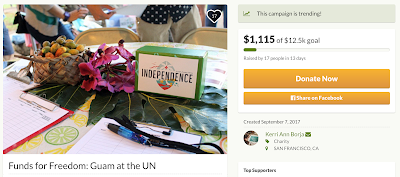Funds for Freedom

Independent Guåhan will be joining a delegation from Guam that is heading to the UN to testify before the Fourth Committee in the first week of October. We are seeking funds to help cover the costs for this trip. If you are able please donate at our Go Fund Me Page "Funds for Freedom. " ************** Håfa Adai! Every October, the United Nations Special Political and Decolonization Committee (Fourth Committee) meets to discuss the status of the world’s 17 remaining Non-Self Governing Territories, including Guam. This is the one opportunity the people of Guam have every year to directly address the 193 member states of the UN General Assembly. This year, the General Assembly will vote on a resolution that includes powerful and important language about the continued colonization and militarization of Guam and the direct impediments to the CHamoru people’s right to self-determination. Guam's governor has also requested a UN visiting mission to assess the status



